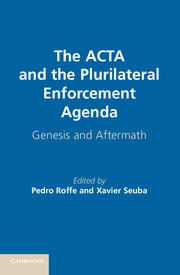Book contents
- Frontmatter
- Contents
- List of Contributors
- Foreword
- Acknowledgments
- Acronyms
- Introduction
- PART I THE FINAL ACT: ITS MAIN FEATURES AND CONTENTS
- 1 An Overview of the Agreement
- 2 ACTA Initial Provisions and General Definitions
- 3 ACTA General Obligations with Respect to Enforcement
- 4 Provisions on Civil Enforcement – Section 2 of ACTA
- 5 Legal Framework for Enforcement
- 6 ACTA and Beyond
- 7 ACTA’s Digital Chapter
- 8 The ACTA Committee
- PART II DOMESTIC LEGISLATIVE CHALLENGES
- PART III IMPACT ON RELATED PROCESSES
- PART IV VIEWS FROM STAKEHOLDERS: LESSONS
- PART V WHAT LIES AHEAD ACTA
- Annex I Anti-Counterfeiting Trade Agreement
- References
- Index
- References
2 - ACTA Initial Provisions and General Definitions
Published online by Cambridge University Press: 05 December 2014
- Frontmatter
- Contents
- List of Contributors
- Foreword
- Acknowledgments
- Acronyms
- Introduction
- PART I THE FINAL ACT: ITS MAIN FEATURES AND CONTENTS
- 1 An Overview of the Agreement
- 2 ACTA Initial Provisions and General Definitions
- 3 ACTA General Obligations with Respect to Enforcement
- 4 Provisions on Civil Enforcement – Section 2 of ACTA
- 5 Legal Framework for Enforcement
- 6 ACTA and Beyond
- 7 ACTA’s Digital Chapter
- 8 The ACTA Committee
- PART II DOMESTIC LEGISLATIVE CHALLENGES
- PART III IMPACT ON RELATED PROCESSES
- PART IV VIEWS FROM STAKEHOLDERS: LESSONS
- PART V WHAT LIES AHEAD ACTA
- Annex I Anti-Counterfeiting Trade Agreement
- References
- Index
- References
Summary
Introduction
The proposed “new international standard for intellectual property enforcement,” the Anti-Counterfeiting Trade Agreement (ACTA), includes six chapters, the first of which contains the initial provisions (Section 1) and definitions (Section 2).
ACTA Chapter I addresses fundamental aspects and shapes the scope and the interpretation of the entire treaty. Moreover, most of the ACTA “provisions committed to balanced enforcement procedures” are found in this chapter, something which, added to its horizontal impact, explains its decisive role. In this last regard, given the overall orientation of the agreement, which is perceived as largely favouring right holders, some of the provisions of Chapter I could play an important balancing function.
Despite their importance, the implications of the six articles that make up this chapter are not always clear. Some of the provisions merely transplant twin provisions of the World Trade Organization (WTO) Agreement on Trade-Related Aspects of Intellectual Property Rights (TRIPS) and, together with them, old doubts and unsettled questions. Worth noting is also that the context of the transposed norms is now different, hence the interpretation of very similar articles in TRIPS and ACTA could diverge. Potential difficulties are aggravated by the fact that not all the links originally made by the norms transplanted from TRIPS have been incorporated into the ACTA text. Added to this, the general wording that usually characterises this type of provisions and chapters permits diverging readings. Finally, Chapter I is not limited to general principles and guidance, and it also contains some important “TRIPS plus” provisions as well as some fundamental safeguards.
- Type
- Chapter
- Information
- The ACTA and the Plurilateral Enforcement AgendaGenesis and Aftermath, pp. 46 - 65Publisher: Cambridge University PressPrint publication year: 2014

